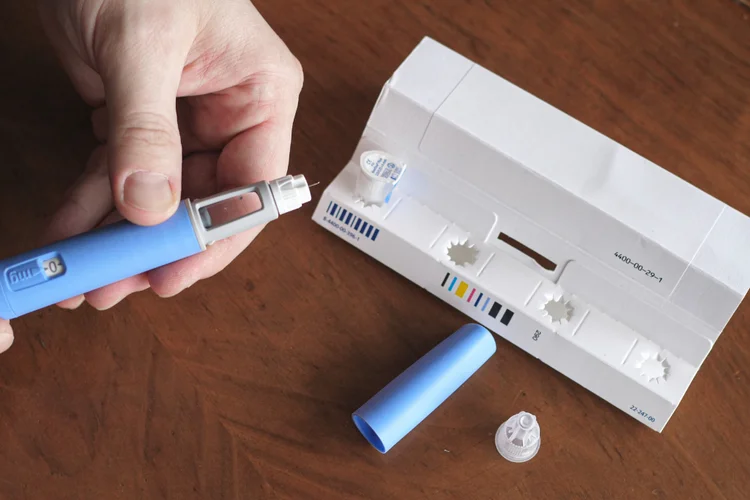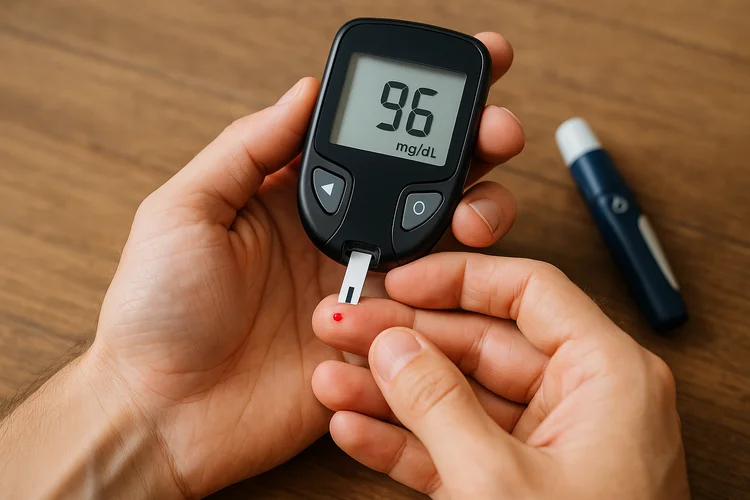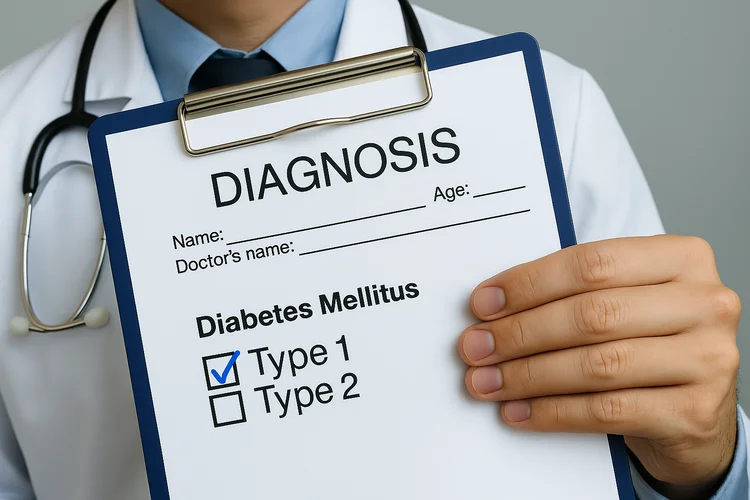What Is Liraglutide?
Liraglutide is a prescription medicine used to manage type 2 diabetes and to
assist with long-term weight
control in individuals who are obese or have excess
body weight. It is marketed under the brand names Victoza® and Saxenda®.
As part of the GLP-1 receptor
agonist (GLP-1 RA) group of medicines, liraglutide acts in a similar
way to the body’s natural hormone glucagon-like peptide-1. This action helps
lower blood sugar, reduces appetite, and slows the rate of stomach emptying.
Liraglutide treatment is usually paired with lifestyle modifications such as
healthy eating, regular physical activity, and, when required, additional
therapies as part of a broader care plan.

Liraglutide Mechanism of Action: How Does It Work?
Liraglutide works by enhancing the body’s ability to control blood sugar and regulate appetite. It does this in several ways:
- Promote insulin release when blood sugar levels rise, moving glucose from the bloodstream into cells.
- Reduces glucagon production, which lowers the liver’s glucose output and stabilises blood sugar.
- Slows down stomach emptying, leading to prolonged feelings of fullness and fewer spikes in blood sugar.
- Acts on the brain’s hunger centres to reduce appetite, leading to lower food intake and supporting weight management.
Liraglutide vs Other GLP-1 Medications
Liraglutide belongs to the wider class of GLP-1 receptor agonists, which are prescribed for managing type 2 diabetes and supporting weight management. Although these medicines act through a similar mechanism, they differ in dosing frequency, receptor targets, and the specific conditions for which they are approved.
| Medication | Receptor Targets | Dosing Frequency and Route | Used For |
|---|---|---|---|
| Liraglutide (Victoza® / Saxenda®) | GLP-1 only | Daily injection (under the skin) | Type 2 diabetes (Victoza), weight management (Saxenda) |
| Semaglutide (Ozempic® / Wegovy® / Rybelsus®) | GLP-1 only | Weekly injection (under the skin) | Type 2 diabetes (Ozempic), weight management (Wegovy) |
| Dulaglutide (Trulicity®) | GLP-1 only | Weekly injection (under the skin) | Type 2 diabetes |
| Tirzepatide (Mounjaro) | GLP-1 & GIP | Weekly injection (under the skin) | Type 2 diabetes, weight management |
Liraglutide Uses
Liraglutide is prescribed under two brand names, each approved for different conditions.
- Type 2 Diabetes (Victoza) – Helps lower blood sugar in adults and adolescents aged 10 years and above, particularly when other treatments are not sufficient.
-
Weight Management (Saxenda) – Given at a higher dose
than Victoza, it is used together with diet and exercise to support
long-term weight control in adults with:
- A BMI of 30 or higher (obesity), or
- A BMI of 27 or higher (overweight) with conditions such as high blood pressure, high cholesterol, or type 2 diabetes.

Liraglutide Dosage and Administration
Liraglutide is given once a day as an injection under the skin, usually in the stomach, thigh, or upper arm.
- Victoza (Type 2 Diabetes) – Treatment usually starts at 0.6 mg daily, gradually increased to 1.2 mg or 1.8 mg if required for better blood sugar control.
- Saxenda (Weight Management) – Begins at 0.6 mg daily and increases by 0.6 mg each week until a maintenance dose of 3.0 mg is reached, provided it is well tolerated.
The exact dosage and any adjustments over time is based on individual needs and
medical advice. Your doctor will monitor your progress, assess your response, and
recommend changes as needed.
Disclaimer: This information is for general reference only and
should not replace professional medical guidance.
Potential Liraglutide Side Effects
Like all medications, liraglutide may cause some side effects. Common ones include:
- Digestive issues such as nausea, vomiting, diarrhoea, constipation, or stomach discomfort.
- Reduced appetite or changes in taste.
- Reactions at the injection site, including redness, swelling, or itching.
- Fatigue or low energy.
- A slight increase in heart rate.
Most side effects are mild and improve with continued use. However, seek medical help immediately if you notice:
- Severe or ongoing abdominal pain, which may signal pancreatitis.
- Symptoms of gallbladder problems, including upper right abdominal pain, nausea, or yellowing of skin and eyes.
- Signs of an allergic reaction such as rash, swelling, or breathing difficulties.
Disclaimer: This list of side effects is not exhaustive. Always consult your doctor if you develop unusual symptoms.
Who Should Not Use Liraglutide?
Liraglutide may not be suitable for certain individuals. It is generally avoided in people with:
- Type 1 diabetes, as the medicine relies on the body’s own insulin production, which is impaired in this condition.
- A personal or family history of medullary thyroid cancer or multiple endocrine neoplasia syndrome type 2 (MEN2), due to a possible tumour risk.
- Severe digestive issues such as gastroparesis, since the drug slows stomach emptying further.

Is Liraglutide Available Over the Counter in Singapore?
Liraglutide is not available over the counter in Singapore. It requires a
prescription and must be prescribed by a doctor.
A medical consultation is
necessary to determine whether liraglutide is appropriate for your condition.
Ongoing follow-up is also required to monitor your progress and make any adjustments
to the treatment plan if needed.
Why Choose Us?








Navigate Easy With Google Maps
Health Screening Singapore (Anson House)
Nearest MRT: EW15 Tanjong PagarHealth Screening Singapore (Camden Medical Centre)
Nearest MRT: TE13 Orchard BoulevardHealth Screening Singapore (CPF Jurong Building)
Nearest MRT: NS1/EW24 Jurong EastFrequently Asked Questions (FAQs)
Liraglutide is a prescription medication that supports weight loss by lowering appetite, slowing stomach emptying, and increasing feelings of fullness. These effects make it easier to eat less and reduce overall calorie intake. The medication acts on brain regions involved in hunger regulation. When used together with a healthy eating plan and regular physical activity, it can contribute to steady and long-term weight reduction.
Liraglutide and Ozempic are not the same drug, although both belong to the GLP-1 receptor agonist class, which works by regulating blood sugar and appetite. Liraglutide is found in Victoza® and Saxenda®, while Ozempic® contains semaglutide. They both help with blood sugar control and weight loss, but they differ in how often they are taken, their formulations, and their approved medical uses.
Liraglutide must be taken as a daily injection, which some may find inconvenient compared to tablets. It can cause side effects such as nausea, vomiting, diarrhoea, tiredness, injection-site reactions, or a mild rise in heart rate. Less commonly, it may be linked to pancreatitis, gallbladder issues, or thyroid concerns. Cost and storage requirements can also be drawbacks. Your doctor will help weigh these disadvantages against potential benefits for your health.
Liraglutide is a GLP-1 receptor agonist, meaning it acts in a similar way to the natural hormone glucagon-like peptide-1. By doing so, it encourages insulin release, lowers glucagon levels, slows digestion, and reduces hunger. These combined actions make it useful for both type 2 diabetes care and weight management.
Both exenatide and liraglutide are GLP-1 receptor agonists used in type 2 diabetes treatment, but they vary in how they are taken and formulated. Liraglutide is injected once daily, while exenatide can be given twice daily or once weekly depending on the version. Liraglutide may also provide additional benefits for weight and heart health in some individuals.
Weight changes with liraglutide differ from person to person. Some people notice modest weight loss within the first month, while for others it may take longer. The results depend on your diet, activity level, and how your body responds to the medicine. The most consistent results come when the treatment is combined with long-term lifestyle changes.
Saxenda® does not target belly fat specifically, but it can lead to overall body fat loss, which may include abdominal fat. By reducing appetite and calorie intake, it helps with total weight reduction and may also lower visceral fat when combined with healthy eating and exercise. The extent of belly fat reduction will vary between individuals.
Both Ozempic and Saxenda belong to the same class of medications but have different dosing and approved uses. They are generally well tolerated, though side effects and suitability vary between people. The safer option depends on your health history, treatment goals, and potential risks. Consulting a doctor can help determine which medicine is better suited to you and ensure side effects are monitored.
The price of liraglutide in Singapore depends on the brand (Saxenda® or Victoza®), the clinic providing it, and whether any subsidies apply. Saxenda, which is used for weight management, is usually more costly than Victoza, which is for type 2 diabetes. As costs can differ widely, it is best to check directly with your chosen clinic for accurate and updated pricing.
Sleep problems are not commonly linked with Saxenda®, although some people may notice tiredness or occasional insomnia when starting treatment. These symptoms are usually temporary and may settle as the body adapts. If sleep issues continue, you should consult your doctor to explore whether the medicine is the cause and if adjustments are needed.
Liraglutide is not generally known to harm the liver, but it can influence liver enzymes and may require caution in people with existing liver disease. It may also indirectly benefit liver health by promoting weight loss, which can improve fatty liver disease. If you have liver concerns, your doctor will need to assess whether liraglutide is appropriate for you.
Clinical research shows that liraglutide can improve blood sugar control and encourage weight loss, especially when paired with dietary and lifestyle changes. The degree of success differs between individuals depending on factors such as consistency, dose, and overall health. Many patients achieve meaningful and sustained improvements over time.
There are no strict food restrictions when taking Saxenda®, but greasy, heavy, or very rich foods may make digestive side effects like nausea worse. Sticking to balanced meals, eating smaller portions, and staying well hydrated can help with tolerance. For personalised dietary guidance, it may be helpful to seek advice from your doctor or a dietitian.
Liraglutide may be prescribed for weight management under the brand Saxenda® if you meet certain criteria, such as having obesity (BMI ≥30) or being overweight (BMI ≥27) with health issues like high blood pressure, cholesterol problems, or type 2 diabetes. It is always used together with diet and physical activity. As it is a prescription treatment, you will need a consultation with your doctor to determine suitability.
Liraglutide and semaglutide are both GLP-1 receptor agonists used for type 2 diabetes and weight management, but they differ in how they are taken and how often. Liraglutide is injected once daily, while semaglutide is usually given as a weekly injection or available in an oral tablet form. Both have been shown to be effective, but the choice depends on your health needs and treatment goals. Your doctor can recommend which option is more suitable.
